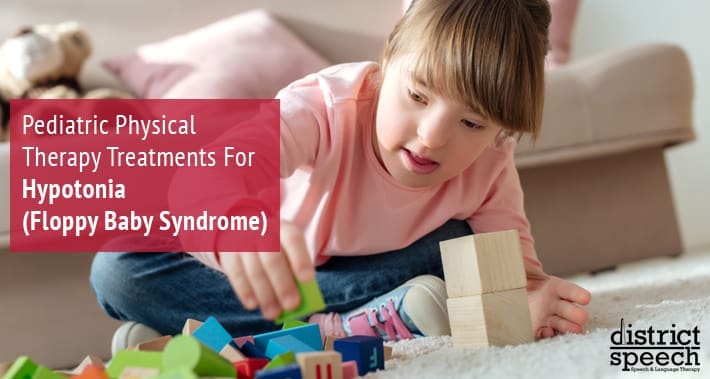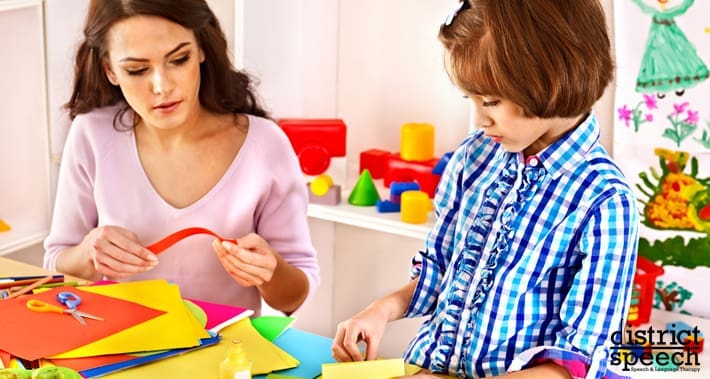
Hypotonia, or floppy baby syndrome, is a condition characterized by having poor muscle tone.
It can develop at any age, and has a large number of possible causes.
The good news is that pediatric physical therapy and pediatric speech therapy are two great options to help your child continue to develop and learn to live with their condition.
This is especially important if the underlying cause can’t be resolved.
It’s definitely a good idea, however, in order to maximize your time so that you can integrate your child’s therapy seamlessly into your daily routine.
Let’s keep reading to find out more about hypotonia and how our pediatric therapy clinic in DC can help your child.
What Is Hypotonia?
Hypotonia, also known as poor muscle tone, is typically detected during infancy or at birth.
It’s also sometimes called floppy baby syndrome.
If your child has hypotonia, they might look limp at birth and be unable to keep their elbows and knees bent.
This will also affect your child’s development, causing difficulty with feeding and motor skills.
Generally speaking, hypotonia affects motor nerves, muscle strength, and the brain.
But, it can be challenging to diagnose because many other diseases and disorders can cause the symptoms of hypotonia.
What Causes Hypotonia?
Hypotonia is typically caused by problems within the nervous or muscular system.
It can also be caused by illness, injury, or an inherited disorder.
One example of this is that it can sometimes be caused by a botulism infection, or contact with toxins.
Hypotonia caused by this method often goes away after recovering.
Other causes of hypotonia can include:
- Cerebral palsy
- Muscular dystrophy
- Traumatic brain injury
Genetic conditions that can cause hypotonia include:
- Prader-Willi syndrome
- Down syndrome
- Tay-Sachs disease
- Trisomy 13 (Patau syndrome)
Benign congenital hypotonia is when you’re born with hypotonia that is not connected with a separate condition.
Some children with benign congenital hypotonia have learning disabilities or developmental delays which can persist throughout childhood.
Physical therapy and speech therapy for kids are two great resources to use to help your child gain muscle tone and remain on track developmentally.
In most cases, these are lifelong conditions that will require constant care and treatment.
Hypotonia Symptoms
Symptoms of hypotonia can appear at any age depending on its cause.
Some symptoms of hypotonia in children and infants are:
- Delayed gross motor skills development
- Delayed fine motor skills development
- Difficulty controlling their head and neck
Signs of hypotonia that can develop at any age include:
- Poor reflexes
- Decreased muscle tone
- Decreased strength
- Hyper flexibility
- Speech challenges
- Impaired posture
- Decreased physical activity endurance

How Can A Pediatric Physical Therapist Help
A pediatric physical therapist can help by creating a program to improve muscle tone that will consider the underlying cause, if there is one.
Specifically, it depends on if there is a cure possible for the underlying cause.
If there’s not, then the program developed by your pediatric physical therapist will focus on the improvement and support of your child’s muscle function.
They’ll do this by first evaluating their current level of muscular ability by having them perform a series of exercises and tasks.
Then, depending on the specific needs of your child, the main goals within their program can include:
- Improving posture and coordination to compensate for their low muscle tone
- Strengthening muscles around the joints of their arms and legs to improve stability and general support.
Your child will accomplish these goals by following a program that includes a range of exercises for them to complete daily.
The goal should be for you to help make this fun for your child and integrate these exercises into your child’s daily routine at home and at school.
How Can A Speech Therapist Help?
A speech therapist will assess your child’s feeding and swallowing abilities.
They will also identify if your child needs speech therapy for pediatric dysphagia, which is sometimes associated with hypotonia.
From here, your pediatric speech therapist can make recommendations about feeding support and design a program that will appropriately change your child’s feeding and swallowing behavior.
This includes emphasizing correct actions and discouraging incorrect behaviors.
Other techniques your pediatric speech therapist may use are:
- Shaping
- Prompting
- Behavior modeling
- Presenting cues
- Reinforcing alternate behaviors
- Stimulus fading
Sometimes, they might also recommend diet modifications to include foods that will be easier for your child to swallow.
These modifications can include adjustments to texture, temperature, taste, size, viscosity, and portion.
You can also thicken liquids or soften solid foods to make them easier to swallow.
This is where you’ll have to work together with your pediatric speech therapist in order to continue your child’s program at home and use the appropriate dietary modifications with their tastes in mind.
Book Your Appointment with District Speech Today
As you can see, working with both a pediatric physical therapist and a pediatric speech therapist can be a huge asset if your child has hypotonia.
The program style will vary depending on cause of their hypotonia, which will be customized to target what will be of the most benefit to your child.
Book an appointment today with District Speech to schedule an evaluation with one of our experienced professionals.
1300 I St NW, Suite 400 E,
Washington, DC 20005
- https://g.page/districtspeech
District Speech and Language Therapy specializes in speech therapy, physical therapy, and occupational therapy solutions, for both children and adults, in the Washington D.C and the Arlington Virginia areas.